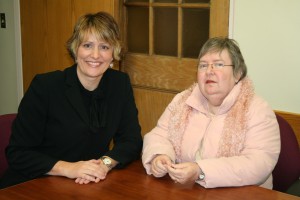I’ve been writing here since 2006 with a genuine interest in better communicating with our school community and also to provide a space where people within our school community can share their thinking with me. Oftentimes, I will receive a comment that the writer asks I not share publicly or a separate email in which the writer wants to keep his or her thoughts between us. I write and read because I want to be a better superintendent. If I ever reach the point when I’m working in an echo chamber, I will need to retire. The absolute worst leader I could be is someone who believes solely in her own ideas and decisions without considering the ideas of others within our organization and community.
I also learn from asking questions and believe wholeheartedly that we’re better together than we are alone. Collectively, our teams learn from one another, offer different points of view and make better decisions–if we listen to one another first.
This weekend, I received four comments from people beyond our school community that I haven’t yet posted to the blog. Over the past seven years of writing, I can count one or two times that I haven’t posted a comment and that was only because the comment was in some way laced with profanity or unjustly injurious to someone within the organization.
Why am I hesitating to post these comments? Well, read these excerpts of the comments to get a better idea of what exactly the comments are about, all left in response to this post.
Reader #1 writes:
I am thankfully not in your district, but I am appalled at your response. To consider a child who is abiding by parent’s wishes as insubordinate in regards to testing where there IS a refusal option, (Source: New York State Student Information Repository System (SIRS) Manual, pg 64). There is no given grade, no consequences for the child, or harm against the school, seems to really be pushing the extreme of the definition of insubordination. (Source: New York State Student Information Repository System (SIRS) Manual, page 64 and 8.) Don’t blame NYSED for this. This is strictly under your district. NYSED leaves it to districts to determine what, if any action should be taken in the event students are not tested.
I suppose that is what I find most troubling about your post, you are offering regulations provided by NSED, but not disclosing them fully or presenting the whole picture to the parents. I’m not sure what you expect parents to do regarding testing they deem harmful to their children? Sit back and just take it?
How is it you claim to want to work with parents, yet your post clearly states what it is believed parents cannot do, rather than what they can do?
Reader #2 writes:
Sometimes, standing up for what you believe in puts you in a difficult position. This is quite true. Some would say a student who refuses the test is “insubordinate”. I would say s/he is practicing civil disobedience to make a point that continues to fall on deaf ears!
Your post sounds like a warning to parents not to challenge YOUR authority. Many districts have been able to work WITH parents in a reasonable way. Apparently, under your guidance, your schools won’t.
Be a leader! Do you really believe the common core and the Pearson assessments represent quality education?
Shame on you!
Reader #3 writes:
Parents may not have a legal right to dictate what schools teach, but we sure as heck have the right to voice our displeasure when we see all of the crap that CC is forcing on our kids. We’re the ones who see first hand the negative effects on our kids. We’re the ones watching our child’s future getting bleaker and bleaker because we have politicians and special interest groups falling all over themselves to experiment and profit off of the games they’re playing with education in this country! When we see English class being turns into a political science experiment meant to brainwash our kids into the current political regime way of thinking, when we see the blatant disregard for the US Constitution and the laws of our country perpetrated by our politicians and educational leaders – we sure as hell have the right to fight back! YOU as educators and administrators do not have the right to bully kids and parents who disagree with you, to outright lie to them about what they can and can’t do. Giving a child multiple detentions when they’re exercising their right to refuse a test is just plain wrong! And they CAN refuse those state tests, kids all over the country are doing it. Why else would the codes and instructions for how to handle refusals be built into the testing instructions? And leaving a special needs child unattended in a hallway because they won’t participate in a benchmark test? Unconscionable!! And the teacher making disparaging remarks to that same child? Inexcusable!! YOU are the ones who should be vastly ashamed of your actions!
What bothers me about the comments left by Readers #1-3 is that it seems that they didn’t even read my original post closely. That’s why I commented on my own post to clarify—this is about a child being instructed to “opt out” on an almost daily basis during the regular school day. Refusing academic intervention services when we know the child needs help or in the case of a special needs child who is refusing to take the regular progress monitoring testing the teacher needs to make good instructional decision making. This wasn’t about the NYS K-8 assessments—I know the points being made about refusal of the NYS tests—but do the writers know that my response to opting out of regular instruction and testing comes straight from education law? I’m not writing this to use my authority or to intimidate. I’m writing to help explain why we have to respond to what becomes a daily distraction–a child refusing to do what the teacher asks. And what teacher is making disparaging remarks to a child as Reader #3 writes? I’m lost by how much is inferred from one post.
Did they even read my post? Or are they using this blog to further their own agenda? I’m glad people are fighting for what they believe in—I believe the discourse on common core AND APPR AND SLOs (because much of what’s being named common core, isn’t) is good—but it is also laden with much bad information, emotion, talk of political agendas and attitudes that remind me of those espoused by religious zealots.
There’s room in the conversation for more than one point of view but the only way we will learn from each other is through a respectful analysis of the ideas.
What bothers me next is the apparent need for writers to attack me without even knowing me, our District, our practices, my character or what we stand for—who are basing their ideas on about 1000 words printed to add another voice to the discussions our community members may be reading in the popular press or frankly, on Facebook. This is most apparent in the last comment that follows here.
Reader #4 writes:
Kim, Kim, Kim, … Parents Do have a right to refuse this corporate schlock you feel obliged to defend. We didn’t ask for it and neither did the teachers. Neither did you if you can be honest about it. But some very wealthy people tucked a few key politicians into their pockets and set about declaring an emergency in American education that they just happened to have the cure for, at a price. Well the price is steep, it’s costing us billions but the real price is it’s robbing our kids of a chance to love learning. It’s causing our kids to hate school and hate themselves. How many more Administrators are going to stand up to this and call it out for the child abuse it is. How many more blog posts do you have in your file before you realize you are on the wrong side of education, the wrong side of kids, the wrong side of history and ultimately, the wrong side of right and wrong. Trying to keep a job that asks you to defend child abuse must be a lonely futile endeavor. Any time you’re ready to stand up for kids and education we will welcome you into the light. Until then you deserve no support and even less respect. P.s. i know you won’t allow this through so I posted it on FB. Cheers!
What purpose is served by patronizing me from the very beginning and using my first name as if this man even knows me at all? And then calling me out about posting his comment? An argument is so much more powerful if made intellectually rather than emotionally. And why is it necessary to call my character into question to make the point? Is the only way that side of the argument holds true is by calling me personally into question?
I won’t use this blog post to defend my own character. That will only incite further comments placing me forever on the defensive. And frankly this reminds me of that person we all know who isn’t really listening to us in the first place but is instead just waiting for us to shut up so that he can voice his own opinion louder or more vehemently or by attacking us for disagreeing. I realize that in responding to the comments I may elicit more comments from them–some would advise me not to acknowledge the comments at all–but I have read about and thought about the ideas presented by these readers and considered our own practices more than the four readers can know from a blog. I cannot solve the national or state debate nor do I honestly have the time and mental energy to engage in an endless back and forth about this—with those outside of our school community. I trust that our own school community knows this about me and feels welcome to come in and meet with me or ask me to a meeting or to attend one of our community forums which include “Clarifying the Common Core”. Or talk to our teachers and principals, don’t just take it from me. As always, we want to be the very best we can be for our 1000 students and that includes teaching to the common core standards, which can be found here.
There are many sides to the changes in education today. Some needed and some not, and I’m guessing what’s which varies depending on who’s talking. What I can speak to is our district, our experiences, and our future. Much good is coming of all of us working together toward common standards and goals—in particular a clearer path for all children through our school that will lead to greater success as we make good instructional decisions for all.


